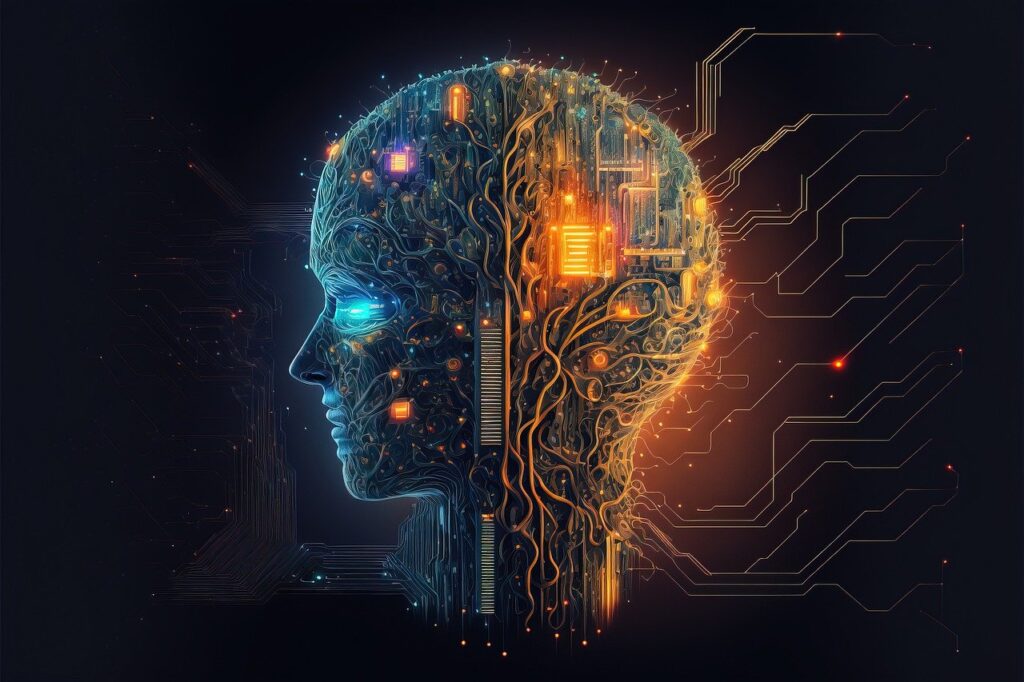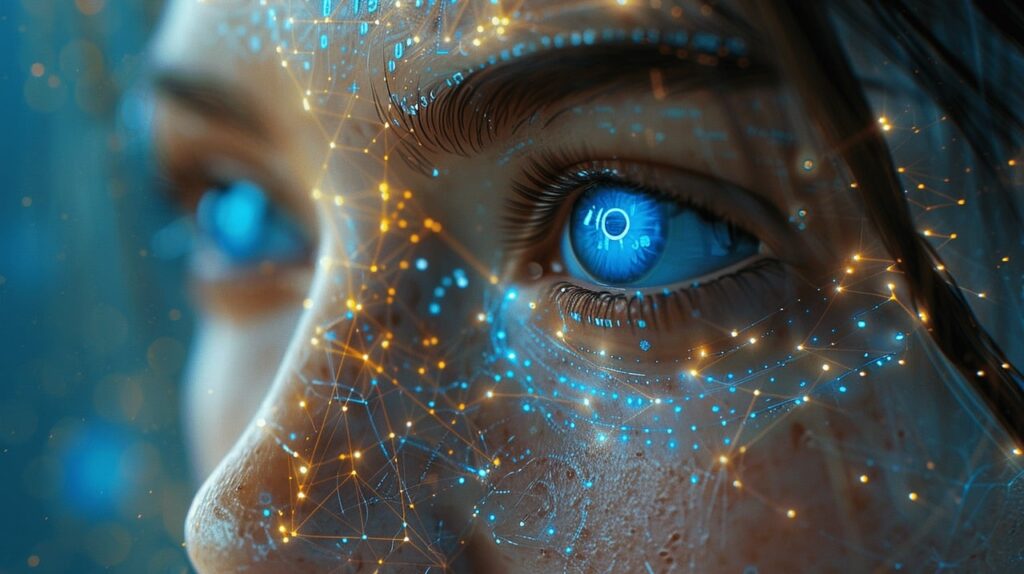What is Artificial Intelligence? Definition
Introduction of AI
Artificial intelligence is altering how individuals live, work, and cooperate with innovation. Beginning from complex robotization to cutting-edge critical thinking, computerized reasoning has arisen as a basic piece of the advanced world. What Artificial Intelligence is? How can it respond?
How about we separate man-made intelligence in basic terms, master in artificial intelligence, and afterward examine what it is making colossal mean for enterprises worldwide? We will explore the essentials of this progressive innovation with Artificial Intelligence images and how it’s influencing the world.

How Artificial Intelligence Works
Computerized reasoning might be depicted as the recreation of human insight through complex calculations, AI, and information handling. It ought to consequently be modified to filter tremendous measures of data, distinguish examples, and pursue the right choices — frequently speedier and more exact than people.
From face acknowledgment to menial helpers, AI is working in the background in practically every application. This part will provide you with a more profound comprehension of how simulated intelligence works, its various kinds, and how it’s reforming enterprises from one side of the planet to the other.
Types of AI
These are the Types of Artificial Intelligence:
1. Strong AI (Artificial General Intelligence or AGI):
- to mimic human intelligence completely.
- capable of doing human-like reasoning, problem-solving, and decision-making.
- Is currently purely theoretical.
2. Weak AI:
- Restrict themselves to one task, they do not strive for complete human-like intelligence.
- Powering most current systems such as artificial intelligence chat and virtual assistants.
- Developed for specific applications like customer care or the translation of language.
3. Reactive AI:
- The most basic kind of AI that responds to specific inputs but cannot learn and evolve.
- A usual occurrence in less complex, rule-based systems.
4. Machine Learning and Advanced Systems:
- The kind of systems that can learn from data; evolving and improving their performances.
- Power technologies like AI generators will provide new content based on other data provided.
Applications of Artificial Intelligence
AI is changing ventures across the world with its always-developing rundown of uses.
1. AI in Healthcare
This AI is changing the face of healthcare through its assistance in quicker, more precise diagnoses, predictive analytics, and personalized treatments. It helps doctors analyze a vast amount of medical data in a short period and can even present an optimal treatment plan. Integration of AI in healthcare boosts patient results, cost reduction, and lessened waiting times.
The future of AI in healthcare promises personalized medicine, where AI-driven insights tailor treatments and prevention strategies to individual patient profiles.
2. AI in Finance and Investment
Artificial intelligence is the game-changer in finance. AI algorithms analyze huge datasets, predicting market trends and helping investors make informed decisions. AI-based financial tools aid in fraud detection, risk management, and even personalized banking services.
3. AI in Education
AI helps develop student-centric learning environments in educational fields. AI-based intelligent tutoring systems, automated grading, and curriculum planning help increase the efficiency of educational systems. In educational systems, AI makes learning easier by better exploiting lessons adjusted to the student’s individual needs.
The future of AI in education lies in personalized learning experiences, where AI tailors content and teaching methods to meet individual student needs.
4. AI in Cyber Security
Artificial intelligence and network safety remain closely connected, in the journey to shield data from progressively complex digital assaults. The systems working on AI can be proactive, detect anomalies, and respond immediately, which can give rapid and, in many ways, more accurate threat detection. AI keeps learning from incidents, enhancing defense mechanisms.
5. AI in Transportation
Indeed, it will drive the future of transportation with autonomous vehicles and smarter traffic management systems, self-driving cars, drones, and AI-based logistics that lead toward the minimization of human error and the realization of safe roads. Optimizes route and schedule in logistics in terms of time and resources.
6. Entertainment and media
Artificial intelligence is quickly altering how diversion content is made and consumed. AI tools enable scripts, analysis of audience preferences, and customized recommendations. To a large extent, AI is dependent on streaming services to make content according to individual preferences.

History of Artificial Intelligence
The journey of AI is a story of innovation and ambition itself. The actual concept of AI began shaping up in the 1940s, thanks to the early theoretical work by pioneers like Alan Turing, who proposed that creating such machines was possible that think.
Official birth came within the 1950s with the coming into existence of the term “artificial intelligence” and the first AI programs with the ability to play games like chess and solve mathematical problems. It also featured the creation of some base theories and algorithms on which further research was done. With this stage, AI research moved into the 1960s and 1970s.
The first set of expert systems was made to solve some specific tasks in which it excelled accurately, just as an expert would. There was, in the 1980s, a wave of optimism that had got it known as the “AI Winter,” in light of unmet expectations and funding cuts.
However, interest renewed in the 1990s and 2000s with breakthroughs in machine learning and data analysis, boosted by increasing computational power. Mainstream adoption of AI was seen in the 2010s when technologies like AI chat systems, and AI generators revolutionized industries.
Today AI is changing rapidly in terms of the surrounding applications and all, converting various fields from cybersecurity to healthcare. That is why these have shown remarkable journeys from theoretical concepts into practical innovations.
Advantages and disadvantages of AI
Advantages of AI
AI provides many advantages that impact areas in significant ways. Such a key benefit is automation; AI can carry out monotonous and repetitive work with much accuracy and effectiveness, allowing human workers to handle more complex, innovative, and valued work. In the financial field, artificial intelligence stocks use complex algorithms in the market to work out valuable insights for investors, maximizing the trading strategy.
Disadvantages of AI
AI has its merits, but it also has some drawbacks. The most severe challenge is the coupling of artificial intelligence and cyber security; since AI tends to be quite complicated, its system is prone to some form of cyber attack, which compromises sensitive information and systems. The other adverse effect is job dislodging: AI can replace things that were previously done by humans, thus making people lose their jobs and causing a shift in the economic system.
Future of Artificial Intelligence
According to others, the future of AI is going to be both exciting and transformative; innovations are supposed to reshape industries and life itself. As AI advances, there will be much more sophisticated applications, from advanced AI generators to create high-quality, original content and art and down to breakthroughs in artificial intelligence and cybersecurity, thereby helping improve our defense against cyber threats.
All fields will in the future look forward to the integration of AI, presenting innovative and wonderful possibilities to power innovation and enhance our quality of life.

FAQs
Q1: What artificial intelligence is?
Man-made intellectual ability (man-made knowledge) is any development that enables machines to perform tasks that typically require human understanding, such as getting, thinking, and decisive reasoning.
Q2: Who invented AI?
It was conceptualized by some of the early computer scientists, who may include here the work of Alan Turing and John McCarthy. McCarthy is popularly known for inventing the term “Artificial Intelligence” in 1956 through the Dartmouth Conference.
Q3: What is the most important thing about AI?
The core purpose of AI is to create systems that can perform tasks inquiring about human intelligence to understand, learn, and solve problems to improve efficiency and find solutions to intricate problems.
Conclusion
Artificial Intelligence is the most forward-leading face of technological advancement, changing entire sectors and styles of living altogether. From being a mere concept when the term was first coined to its present usage in health, finance, and the creative fields, the journey of AI stands as a testament to human ingenuity and ambition.
The future seems pretty promising for AI; continuous growth and improvement promise even more advancement in innovation and quality of life. Fully realizing AI’s true potential requires balancing development, which will be vital in light of wise regulation and ethical concerns.


